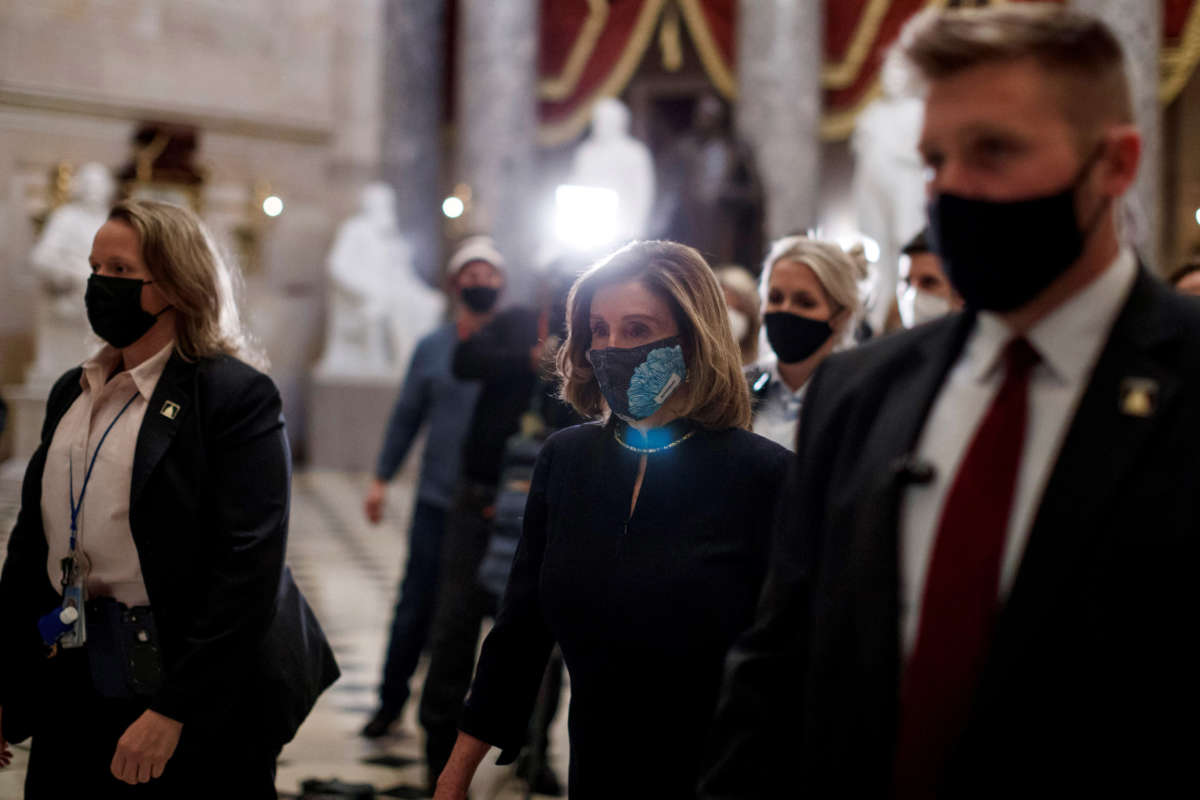Speaker of the House Nancy Pelosi (D-California) has rejected claims from those opposed to former President Donald Trump’s impeachment that pushing forward with a Senate trial would run counter to President Joe Biden’s calls for “unity.”
A number of Republicans, including some in the Senate where the impeachment trial is set to take place, have decried the attempt to impeach Trump after he has already left office.
“If the Senate conducts an impeachment trial, among my considerations will be what is best to help heal our country rather than deepen our divisions,” Sen. Rob Portman (R-Ohio) said.
Sen. John Cornyn (R-Texas), the second-ranking Republican in the Senate, also spoke out against impeachment.
“If they proceed with the impeachment trial, I think that will further divide the country,” Cornyn has said.
Pelosi on Thursday responded to those arguments.
“The president of the United States committed an act of incitement of insurrection,” Pelosi said, referring to the January 6 breach of the U.S. Capitol building. “I don’t think it’s very unifying to say, ‘oh, let’s just forget it and move on.'”
She also noted that doing nothing would encourage future presidents to commit impeachable offenses, as it would set a precedent of having no consequences for their actions during their final days in office.
“Just because he’s now gone — thank God — you don’t say to a president, ‘Do whatever you want in the last months of your administration, you’re going to get a get-out-of-jail card free because people think we should make nice-nice,'” Pelosi added.
Pelosi would not disclose during the press conference when the article of impeachment against Trump would be submitted to the Senate.
“Everyone’s asking — I’m not going to be telling you when it is going,” Pelosi explained. “We had to wait for the Senate to be in session. They have now informed us they are ready to receive, the question is other questions about how a trial will proceed, but we are ready.”
Biden has indeed made several calls for “unity” in the past several weeks, including using the word more than half a dozen times in his inauguration speech on Wednesday.
Biden said in his speech that his “whole soul” is in “bringing America together” and in “uniting our people.”
“We can treat each other with dignity and respect. We can join forces, stop the shouting and lower the temperature,” Biden said. “For without unity, there is no peace, only bitterness and fury. No progress, only exhausting outrage. No nation, only a state of chaos. This is our historic moment of crisis and challenge, and unity is the path forward.”
In that same speech, however, Biden described those involved in the Capitol breach as a “riotous mob” that sought to “use violence to silence the will of the people.”
“It will never happen. Not today. Not tomorrow. Not ever,” Biden added.
Biden has been quiet on the topic of an impeachment trial. In remarks on Wednesday evening, White House Press Secretary Jen Psaki emphasized that the president would not interfere with the Senate’s “constitutional duty” to try Trump, while expressing hope that Congress can also continue “to conduct the business of the American people.”
“He’s going to leave the mechanics, the timing and the specifics of how Congress moves forward on impeachment to them,” Psaki said.
In the single article of impeachment against Trump, a majority of lawmakers in the House of Representatives (including 10 Republicans who crossed the political aisle to support the measure) alleged that the former president “threatened the integrity of the democratic system, interfered with the peaceful transition of power, and imperiled a coequal branch of Government.”
Trump has described his speech on January 6, which many have claimed led the mob of his loyalists to violently attack the Capitol, as “totally appropriate.” In that speech, the former president continued to wrongly state that the election was “stolen” from him “by emboldened radical left Democrats” and by “the fake news media.”
Trump also told his loyalists, “You don’t concede when there’s theft involved,” adding that they would “never take back our country with weakness.”
Hundreds of his loyalists heard his words, then walked to the Capitol, where they broke in and disrupted the Electoral College certification process.
Polling shows that attempts to convict Trump are not as divisive as some Republicans have suggested. A Politico/Morning Consult poll, for example, conducted January 15-17, found that 55 percent of Americans back Senate conviction, with only 37 percent opposed.
In an Economist/YouGov poll conducted from January 16-19, respondents were asked whether they believed Trump should be barred from being able to run for president again, which the Senate could vote on if they vote to convict Trump. Less than four-in-ten were opposed to the ban the poll showed, while 55 percent of Americans were supportive of such a move.
We have 10 days to raise $50,000 — we’re counting on your support!
For those who care about justice, liberation and even the very survival of our species, we must remember our power to take action.
We won’t pretend it’s the only thing you can or should do, but one small step is to pitch in to support Truthout — as one of the last remaining truly independent, nonprofit, reader-funded news platforms, your gift will help keep the facts flowing freely.
